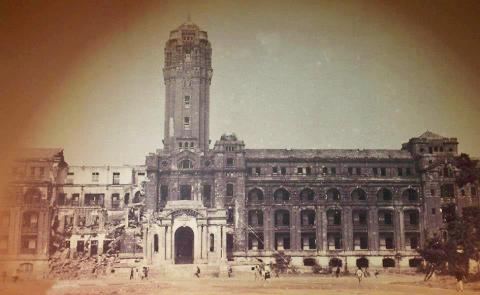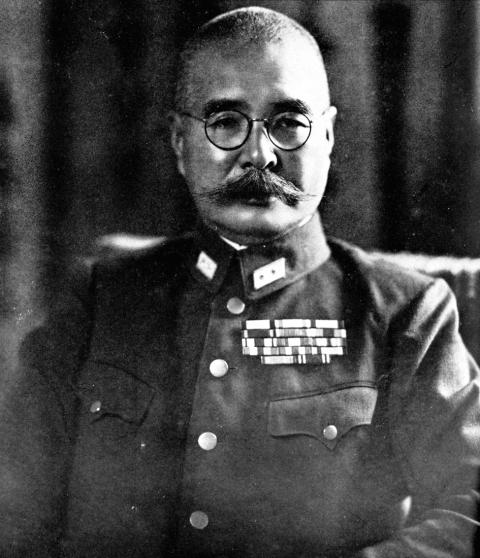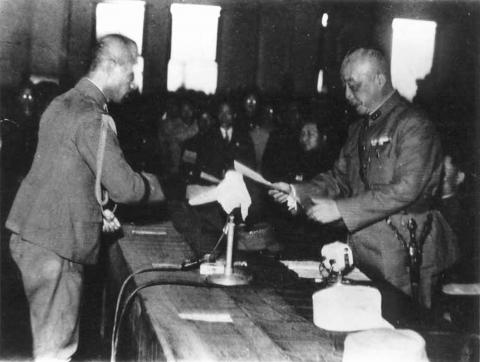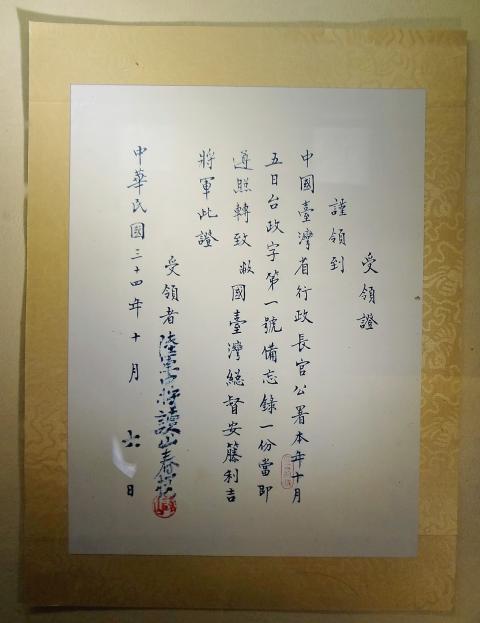Jan. 1 to Jan. 7
On April 19, 1946, Rikichi Ando, the former final governor-general of Taiwan, was found dead in his holding cell in Shanghai.
It was a swift downfall for Ando, who was arrested not too long after representing Japan in the surrender ceremony of Taiwan to the Chinese Nationalist Party (KMT) on Oct. 25, 1945. On Jan. 6, 1946, General Douglas MacArthur announced that Ando was to be tried as a war criminal, but he died before the trial.

Photo courtesy of Wikimedia Commons
Though some say that he was assassinated, the general consensus is that he committed suicide by ingesting potassium cyanide.
Ando was already 60 years old when he took over as governor-general of Taiwan, and his rule was brief due to the Japanese surrender. But there are a few interesting incidents that are worth exploring. He was allegedly responsible for shutting down a Taiwanese independence movement during the 71-day gap between Japanese surrender and the arrival of the KMT. The exact details of the surrender ceremony have also been under dispute, and even his death was surrounded by conspiracy theories.
INDEPENDENCE ATTEMPT

Photo courtesy of Wikimedia Commons
Before he arrived in Taiwan as commander of the local Japanese forces in late 1941, Ando was notorious for his unauthorized invasion of French Indochina following Germany’s defeat of France. This led to a diplomatic confrontation with the US and other Western countries, culminating in the attack on Pearl Harbor and US involvement in the war. He was recalled to Tokyo in January 1941 and forced into retirement as punishment.
This “punishment” did not last long, as he was reinstated and headed to Taiwan in November, eventually taking over in December 1944 as governor-general following the resignation of Kiyoshi Hasegawa. As Japanese were running low on supplies at battlefields around the world, his rule was mostly focused on economic production and conscripting soldiers.
After the Japanese surrender on Aug. 15, George Kerr writes in Formosa Betrayed that “for nearly 24 hours, the [colonial] Taipei government was gripped in fearful debate.”

Photo courtesy of Wikimedia Commons
Some thought that the emperor expected them to defy his orders to surrender and argued that they should make a last stand in Taiwan. But Ando insisted on handling things peacefully and accepting the situation, with most of his officers in support. Some couldn’t bear the shame and committed suicide.
In the following days, either pro-war Japanese officials or Taiwanese elite hatched a plan to create an independent Taiwan before the KMT arrived. Kerr writes, “rumor spread that some intransigent Japanese officials proposed a ‘Taiwanese Independence Movement.’” Hsu Chieh-lin (許介鱗) writes in Foreign Policy of the Republic of China that Japanese officials colluded with leading Taiwanese with the Taiwanese taking a “passive role.” However, Masami Kondo writes in Total War and Taiwan that there were two camps of Taiwanese plotting independence and does not mention Japanese involvement. Finally, historian Su Yao-tsung (蘇瑤崇) argues in several studies that the “movement” involved several groups of Taiwanese and stresses that the Japanese were not involved.
Nevertheless, all versions agree that Ando dismissed the idea, Kondo adding that he threatened to mobilize his army to fight anyone who would attempt such a plan.

Photo courtesy of Wikimedia Commons
In March 1946, the KMT arrested a group of Taiwanese elite for their involvement in the independence attempt. One of them was businessman Koo Chen-fu (辜振甫), who would become a prominent KMT member in the future and represented Taiwan in the historic 1993 cross-strait Koo-Wang talks (辜汪會談) in Singapore.
SURRENDER DOCUMENTS?
Whether the KMT had the right to take over Taiwan after the war is an oft-debated subject that we won’t delve into detail here, but Su points out something fishy regarding the surrender ceremony in Taipei.
Most versions of the events state that new governor-general Chen Yi accepted the surrender documents from Ando, and from then on Taiwan and Penghu became part of the Republic of China once again.
But in fact, on Oct. 5, Chen already sent Order No. 1 to Ando, part of which states that the KMT has taken over all of the “legal territory, people and ruling rights as well as political, economic and cultural institutions and property.” Su writes that the Oct. 25 ceremony was simply held to cement the KMT’s claim over Taiwan.
Su further questions whether Ando actually provided an instrument of surrender or merely handed a signed receipt of Order No. 1 to Chen during the ceremony, as the government had the surrender documents signed in Nanjing on public display but not the one in Taipei. He refers to a telegram sent by Chen’s superior Ho Ying-chin (何應欽) stating that there was no need for a surrender document and Chen’s order would suffice.
Su writes that this order was created as the legal basis for the KMT’s rule over Taiwan, which he calls an occupation at that time rather than retrocession. Of course, there are many who will disagree with this claim.
There are also rumors that Ando was poisoned due to his involvement in a bribery case during his time in Taiwan, but Su dismisses these reports and maintains that he committed suicide.
After Ando’s death, seven of his subordinates were found guilty by the US Military Commission for their involvement in the baseless execution of 14 American prisoners of war in Taipei two months before the war ended. They received sentences ranging from 20 years to life imprisonment.
Taiwan in Time, a column about Taiwan’s history that is published every Sunday, spotlights important or interesting events around the nation that have anniversaries this week.

June 2 to June 8 Taiwan’s woodcutters believe that if they see even one speck of red in their cooked rice, no matter how small, an accident is going to happen. Peng Chin-tian (彭錦田) swears that this has proven to be true at every stop during his decades-long career in the logging industry. Along with mining, timber harvesting was once considered the most dangerous profession in Taiwan. Not only were mishaps common during all stages of processing, it was difficult to transport the injured to get medical treatment. Many died during the arduous journey. Peng recounts some of his accidents in

“Why does Taiwan identity decline?”a group of researchers lead by University of Nevada political scientist Austin Wang (王宏恩) asked in a recent paper. After all, it is not difficult to explain the rise in Taiwanese identity after the early 1990s. But no model predicted its decline during the 2016-2018 period, they say. After testing various alternative explanations, Wang et al argue that the fall-off in Taiwanese identity during that period is related to voter hedging based on the performance of the Democratic Progressive Party (DPP). Since the DPP is perceived as the guardian of Taiwan identity, when it performs well,

The Taiwan People’s Party (TPP) on May 18 held a rally in Taichung to mark the anniversary of President William Lai’s (賴清德) inauguration on May 20. The title of the rally could be loosely translated to “May 18 recall fraudulent goods” (518退貨ㄌㄨㄚˋ!). Unlike in English, where the terms are the same, “recall” (退貨) in this context refers to product recalls due to damaged, defective or fraudulent merchandise, not the political recalls (罷免) currently dominating the headlines. I attended the rally to determine if the impression was correct that the TPP under party Chairman Huang Kuo-Chang (黃國昌) had little of a

At Computex 2025, Nvidia CEO Jensen Huang (黃仁勳) urged the government to subsidize AI. “All schools in Taiwan must integrate AI into their curricula,” he declared. A few months earlier, he said, “If I were a student today, I’d immediately start using tools like ChatGPT, Gemini Pro and Grok to learn, write and accelerate my thinking.” Huang sees the AI-bullet train leaving the station. And as one of its drivers, he’s worried about youth not getting on board — bad for their careers, and bad for his workforce. As a semiconductor supply-chain powerhouse and AI hub wannabe, Taiwan is seeing